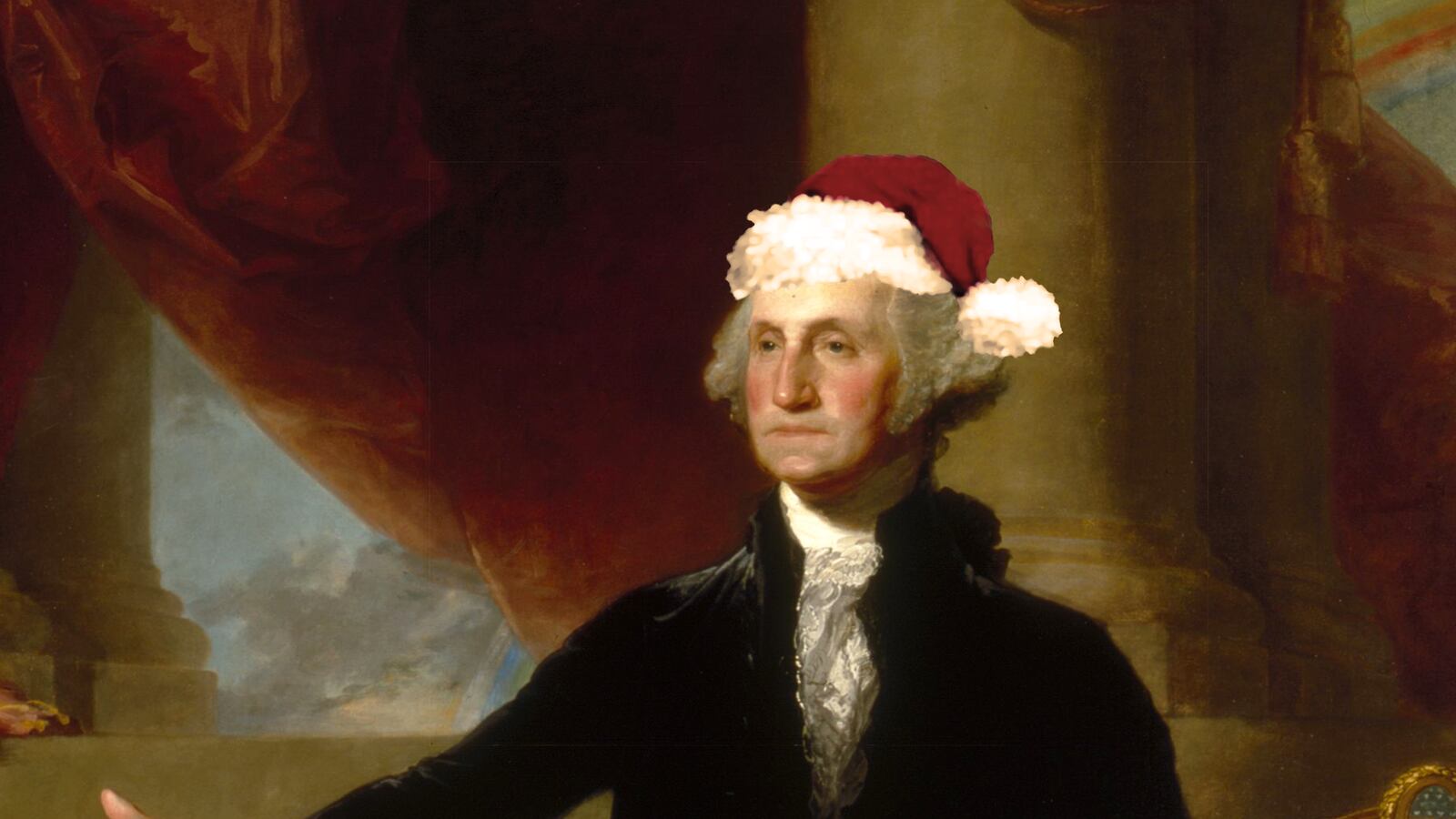The father of our nation knew how to throw a Christmas party.

I’m talking thousands of pounds of bacon, gallons of homemade rye whiskey, a massive “great cake” and what he called an “attack of Christmas pies.” Everyone got four days off to celebrate at his Mount Vernon plantation and while there was no regular scheduled appearance by Santa, there was at least one recorded visit by a camel.
But the abundant Christmas feasts of Washington’s later years were preceded by some years that were lean on Christmas cheer.
When young George was 8 years old in 1740, his home caught fire on Christmas Eve. As a soldier in the British army, Washington spent Christmas Eve of 1753 in a remote outpost known as Murdering Town getting in a skirmish with local Indians, followed by a gift-giving trip to a local “Indian Queen.”
The War for Independence brought highs and lows even on holy days. The low point was inevitably Christmas at Valley Forge, where many soldiers were near starvation and along with the meager mutton and cabbage, there was no whiskey or wine. The high point was the Christmas night where Washington caught snoring Hessians unaware as he crossed the Delaware River and attacked Trenton to turn the tide of the war.
But George Washington’s best Christmas was in 1783. Precisely 230 years ago today, he rode up to Mount Vernon to celebrate his first holiday at home after eight years of revolution. He had resigned his commission just days before and was determined to surprise his family with his presence. They, in turn, surprised him with a feast that would almost make King George III feel at home.
First, soak in this description of Christmas Pie, a traditional British dish that makes a Turducken seem modest. Heaped inside a sturdy crust were layers of meat—“a turkey, a goose, a fowl, a partridge and pigeon”—seasoned with nutmeg, cloves, mace, pepper and salt and slathered with four pounds of butter, all cooked together for at least four hours. Then there was Martha’s recipe for “great cake”—40 eggs, 4 pounds of butter, 4 pounds of powdered sugar, 5 pounds of fruit and a half pint of wine and brandy thrown in for good measure. Add in Washington’s extended family and a few select friends, at it was a welcome respite after nearly a decade on the run in more than 200 encampments.
Martha hoped that “from this moment [they] would grow old together, in solitude and tranquility.” That Christmas wish was not to be. But the intervening years were as close to a domestic idyll as Washington ever experienced.
Christmas in the young Republic was a different affair than we celebrate today. There was no Santa Claus and no Christmas tree—a custom brought later by German immigrants. Gift-giving was not the focus—instead it was all about the family feast—a time to socialize and give faith-filled thanks for the year ending and the new one about to begin.
Christmas Day was primarily a religious holiday, though Washington was at best an occasional churchgoer, despite concerted efforts by subsequent evangelists to literally paint him as far more devout than he was in life. Records show that he was more likely to attend the celebration of St. John the Evangelist at local Masonic lodges on the 27th of December each year than Christmas Day services, though he was a frequent parishioner at St. Paul’s Chapel in lower Manhattan after he was as president.
The Christmas season lasted more than a week and it was a time of celebration and general inebriation. Washington gave his servants—and, yes, slaves—four days off to mark the holiday in broad Mount Vernon-wide celebration. One of the largest distillers in the colonies, Washington supplied a gallon of whiskey as a modest gift even to his slaves and overcame his aversion to intoxication (which he once sonorously described as ‘sacrificing their reason to Bacchus’) to allow one valued employee four days of Christmas drunkenness, as enumerated in his contract.
Always a wealthy man, Washington was known to splurge on diversions for his family and guests. Once, during the war, he shelled out the cash to hire a band on Christmas Day. And in the winter of 1787, a surreal travelling salesman of sorts brought an Arabian camel up to Mount Vernon for the equivalent of $77 today to entertain and educate the extended Washington family.
Even the wealthy have their moments of over-drafts and Christmas of 1788 found Washington writing his business partner, “I have never before felt the want of cash so severely as at present.” So if you’re assessing your own post-holiday finances with some anxiety, you can take comfort that Washington, however briefly, would have been able to relate.
Presidential Christmases in New York and then Philadelphia were more formal affairs with leading legislators than the family-focused fetes most enjoyed by Washington at Mount Vernon. Often in physical distress and under unaccustomed political attack, after the big meal and a winter walk, Washington would play cards and write letters, restrained by the responsibilities of being chief executive.
But a few years of retirement brought Washington back to his beloved Mount Vernon, with its year-crowning Christmas cheer. And in 1797, with less than two years left in his life, he wrote a note to the husband of Martha’s granddaughter which could serve as a Christmas coda from the original founding father: “We remain in Statu quo and all unite in offering you, & yours, the compliments of the season, and the return of many, many more, and happy ones.”
Thanks to Mark Santangelo and Mary Thompson of Mount Vernon for supplying historical research for this column. And Merry Christmas.






